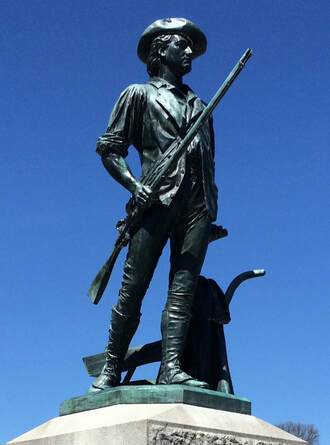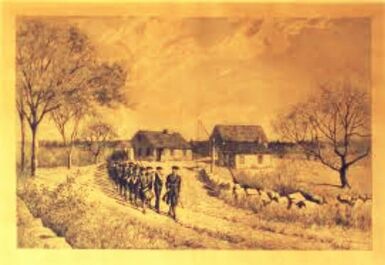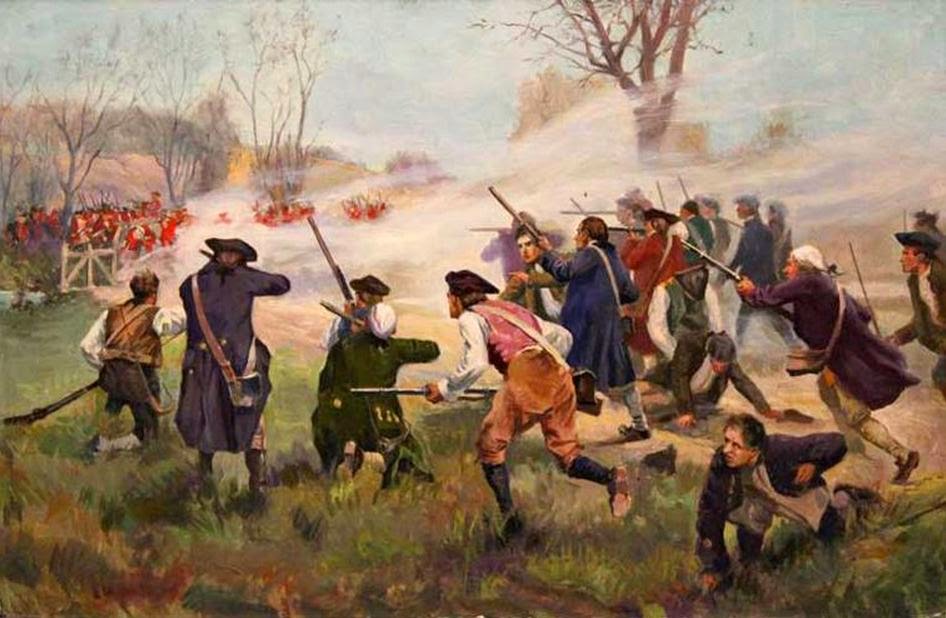
It wasn’t “the shot” that killed Captain Isaac Davis on the morning of 19 April 1775, but one among a disorganized, British volley that felled him and changed the world for eternity.
Isaac Davis was born in Acton 23 February 1745 to Ezekiel and Mary Davis – a rugged son to rugged pioneers. Isaac descends from Dolor Davis who along with Simon Willard, the Reverend Peter Bulkeley, and others were given in 1635 a grant for ‘six myles of square land’ that would become the village of Concord. On 24 October 1764, he married Hannah Brown, and they would have two boys and two girls.
In response to the Massachusetts Provincial Congress’s recommendation, Acton established its militia in the autumn of 1774 to be ready at a minute’s notice should Regulars housed in Boston undertake warlike movements. Private Reuben Law enlisted along with kin, friends, elders, and town leaders. Rank usually coincided with one’s stature within the town, except for Davis who was elected Captain. A gunsmith, Davis insisted his men be well equipped and made rifles for them. They met twice weekly to practice their marksmanship. The camaraderie strengthened under Davis’s discipline. No militia was better prepared than Acton’s when they assembled at his home on 19 April for what fate would deliver three hours later.

Heading toward Concord, the fifer and drummer played "The White Cockade", which tradition holds was Davis’s favorite marching tune. The title refers to the white ribbons worn by Scottish Revolutionaries during the 1745 rebellion of Bonnie Prince Charles. The rousing melody may have appealed to Reuben Law’s Scottish lineage as he took a few jig-steps, ironically, beginning another rebellion against the English thirty years later.
Around nine AM, the Acton Militia reached the Old North Bridge. Over five hundred men from area militia had gather on a hill overlooking the bridge with a hundred or so Regulars occupying it. Meanwhile, in Concord center, British forces were burning wooden gun carriages they had found when they had rummage the town early. Seeing the black plume on the eastern horizon, the colonists believed Concord was being put to the torch. While higher ranking officers dithered amid the pandemonium, Acton’s Captain stepped forward. “I have not a man that is afraid to go.” He led his men two abreast to the western edge of the Bridge.

_________________________________________________________________________
Quiet ensued, except for the meandering river oblivious to its surrounding at this wisp of time in its eternity. The easy flow with a few cherry blossoms afloat was interrupted to swirl around clumps wedged into the bridge supports. The resultant eddy gurgled, distracting Reuben. Its vortex mesmerized him until it became a quiet flow downstream. With a deep breath, Reuben relaxed. The breeze brought a pleasing hint of cherries.
Then, a thunderous volley ripped through Reuben’s inner peace, jolting him into reality. He flinched and shook his head in disbelief. White puffs across from him swirled above muskets; cherry blossom scents had been tinged with a pungent odor of gunpowder. When another roar came from the east, he clutched his firelock.
“My head has been creased,” screamed the young fifer, Luther Blanchard. The boy grabbed his head and slumped. Agape, Reuben riveted on the thrashing, still screaming Luther.
“Fire, fellow soldiers. For god’s sake, fire,” said Concord’s Major John Buttrick.
Reuben turned to the voice. On cue, Captain Davis took aim. He’ll avenge Luther, he thought. With another roar from the east, Captain Davis collapsed; and with another, Abner Hosmer staggered.
“Fire on that bloody bastard who shot Captain Davis,” said Philip.
“Where?”
Pointing, Philip said, “There, at the smoke above the bearskin cap.”
The volleying continued as men yelled. Firelocks hissed and exploded. Smoky puffs had vaporized into a haze. Bucolic fragrances had given way to a bitterness that stung the lungs. A serene spring morning was lost amid chaos at a tiny bridge on 19 April 1775.
Amid the haze, Reuben had no distinct target until a bearskin cap emerged. Set against a blue sky, the black fur was an ideal target. “Just below that cap, square on his forehead. God, let this shot find the bastard’s skull for Captain Davis.” A deafening roar came as his gun butt slammed his shoulder.
“Did you get him?”
The smoke blurred his vision. “I don’t know, Philip.”
The Regulars pulled back toward Concord Center, and the volleying ceased. Confusion abounded, particularly with the Acton men who had been at the front and, now, their Captain lay motionless. Drummer Abner Hosmer was dead, and Fifer Blanchard’s head was being bandaged. “The White Cockade” would not be played to rally the troops. Some pursued the retreating Regulars in a pell-mell manner.
Still stunned, Reuben jockeyed among the chaos toward his Captain. As he neared, Davis lay still. His body had been little altered, still conveying a virility. His determined face appeared as it had when he had said, “I have not a man who is afraid to go.”
Reuben hoped his Captain’s wounds weren’t fatal. But with another step, he saw a wine-colored spot the size of a musket ball that expanded to a watery crimson with clumps of innards. Captain Davis had been squarely hit in the chest; he was dead.
Reuben wanted to weep, but he knew if he did, he would have disappointed his Captain. Besides, he was too numb to cry. He thought about Davis’s earlier words when he had rebuked two men for boasting about a chance to kill ‘old General Gage’, the British commander.
“This is a most eventful crisis for the Colonies. Blood will be spilt, that is for certain; a crimsoned fountain would be opened. None can tell when it would close nor with whose blood it would overflow. Let every man gird himself for battle, and not be afraid. God is on our side. It is my great hope that this country be free.”
Captain Davis had foreseen it all, Reuben thought. He wondered if his Captain had been prescient enough to foresee his own death, too. When will this crimson fountain of death cease to flow, he wondered?

 RSS Feed
RSS Feed
